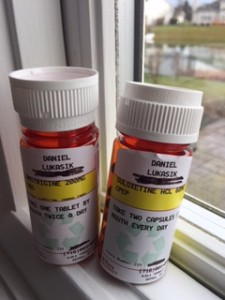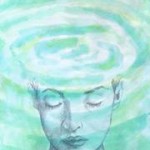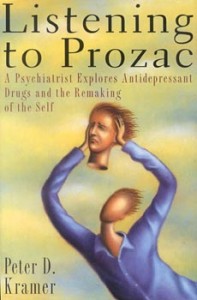Dr. Abigail Zuger writes in The New York Times, “Dr. Kramer’s bottom line is well summarized by the double meaning of “Ordinarily Well: The Case for Antidepressants” — he argues that antidepressants work just about as well as any other pills commonly used for ailing people, and that the drugs keep people who take them reasonably healthy.” Read the News
Book Review: ‘Ordinary Well: The Case for Antidepressants
“Plop, Plop, Fizz, Fizz” – Oh, What a Relief it is? Our Relationship with Antidepressants
Most folks with depression have a complicated relationship with their antidepressant medications.
I certainly do.
While these pills saved my life years ago when major depression struck, years later, I often wonder if I still need to take them, or, if they’re still effective.
If I feel tired and flat on a particular afternoon, is it depression, the side effects of my meds or a jumble of both? Or maybe, it’s just my persistently pensive nature?
I think about this a lot these days – and maybe you do as well.
While the one-two punch of Cymbalta and Lamictal have kept me out of the dungeon of major depression for years, its comes with a cost. I have interludes of passivity, numbness, and fatigue. Maybe a low-grade depression at times, as well. If I ditch the drugs, maybe I will feel more “alive,” I think. I fantasize that cutting my ties with meds could lessen the days lost to the deadening grayness of a medically induced sense of normalcy I sometimes go through.
But I also feel anxiety. If I went cold turkey and lived medication-free, would it end, well, in disaster? A return to the swampland of depression? A deadman’s land if ever there was one. Can I take that chance? Should I?
There’s scary research that suggests once you stop antidepressants that work (or sort-of-work) for you and try to go back on the same ones because being off of them caused your depression to return (or you just couldn’t tolerate the horrible side effects that can come with discontinuation), there’s a good chance they won’t be as effective.
So, what’s a depressed person supposed to do? What should I do?
There are two camps that offer some guidance on this issue. Both have persuasive arguments about why those afflicted should or shouldn’t stay on meds.
The Stay on the Meds Camp
If depression is an “illness,” like diabetes or heart disease, I need these meds to balance out my of whacky neurochemistry. Given my risk factors: a family history of depression (genetics), a crazy childhood with a nutty, abusive and alcoholic father, and a high-pressure job with too much stress, I should stay on the pills.
In his insightful essay in the New York Times, In Defense of Antidepressants, psychiatrist, Peter Kramer, author of the best-selling books, Listening to Prozac and Against Depression, suggest that studies show this: for mild or moderate depression, talk-therapy is as or more effective that medication. But for the Moby Dick sized sucker called Major Depression? Medications are warranted, and, indeed, lifesavers. They help many to function and live productive lives, albeit with a range of mild to more severe side effects.
The Get off the Meds Camp
Some people (including psychiatrists) see meds as the devil’s handiwork: supposed chemical solutions to emotional problems that flat-out don’t work. Many psychiatrists’ (and family doctors who write the overwhelming majority of scripts for these drugs in the U.S.), they maintain, are “pill pushers” who do the bidding of “BigPharma”, a multi-billion dollar industry in this country. Antidepressants aren’t so much a cure as a curse.
Irving Kirsh, Ph.D., author of The Emperor’s New Drugs: Exploding the Antidepressant Myth, writes:
“Putting all [the research] together leads to the conclusion that the relatively small difference between drugs and placebos might not be a real drug effect at all. Instead, it might be an enhanced placebo effect, produced by the fact that some patients have broken [the] blind and have come to realize whether they were given drug or placebo. If this is the case, then there is no real antidepressant drug effect at all. Rather than comparing placebo to drug, we have been comparing ‘regular’ placebos to ‘extra-strength’ placebos.”
The remedy from this group? Psychotherapy. They see depression as the result of off-kiltered, negative thinking patterns. The way out of these ruminative, pessimistic thoughts involves working with a therapist who uses, most often, Cognitive Behavioral Therapy, to challenge and encourage patients to replace such thoughts with more realistic and positive ones.
In his book Undoing Depression: What Therapy Doesn’t Teach You and Medication Can’t Give You, Richard O’Connor, Ph.D. argues that both therapy and medication are effective, but limited in certain respects. He advocates an additional factor often overlooked in depression recovery: our own habits. Unwittingly we get good at depression. We learn how to hide it, how to work around it. We may even achieve great things, but with constant struggle rather than satisfaction. Relying on these methods to make it through each day, we deprive ourselves of true recovery, of deep joy and healthy emotion.
The book teaches us how to replace depressive patterns with a new and more effective set of skills. We already know how to “do” depression-and we can learn how to undo it.
Some Recent News on the Meds and Therapy Conundum
The New York Times reports that a large, multicenter study by Dr. Charles Nemeroff, then a professor of psychiatry at Emory and now at the University of Miami, found that for depressed adults without a history of abuse, there was a clear ranking order of treatment efficacy: Combined psychotherapy (using a form of cognitive behavior therapy) and an antidepressant (in this case, Serzone) was superior to either treatment alone. But for those who had a history of childhood trauma, the results were strikingly different: 48 percent of these patients achieved remission with psychotherapy alone, but only 33 percent of these patients responded to an antidepressant alone. The combination of psychotherapy and a drug was not significantly better than psychotherapy alone.
So what’s a depressed person supposed to do?
I don’t know, really.
We’re in a pickle, aren’t we?
Maybe there’ll be a soon-to-be discovered test that can guide us on precisely what to do. But for now, many of us will stay-the-course and, for better or worse, stick to the “plop, plop, fizz, fix”.
I see myself somewhere in the middle of all this. I’ve never been hospitalized or tried to commit suicide. But I have known depression’s scorching winds, gales that have torn the flesh from my body. I will never forget this pain. It’s scarred me. And I never want to return to it.
If you’re thinking of discontinuing your meds, here’s a great article on how to do it safely.
I welcome your comments about your depression journey with or without medicaton.
Copyright, 2017
by Daniel T. Lukasik
The Dark Side of Antidepressants
As I’ve intimated, drug industry research on the newer antidepressants has been manipulated to maximize positive results and minimize the downside. Here’s one example: the original research that got FDA approval and set off the craze for these drugs had very low standards, which were not revealed to the public.
They were generally two- or three-month trials, very short over the lifetime course of depression, and the definition of cure was simply no longer meeting all the criteria for major depression. You might still be feeling suicidal and wracked with guilt, but if your sleeping had improved, as far as the FDA was concerned, the drug had demonstrated its effectiveness. Then there was the fact that in all these trials the drugs proved only slightly better than placebo—in most cases, about 40 percent of people got better with a sugar pill, and about 50-60 percent improved with an SSRI. Added to that is the fact that many of these studies stacked the deck by excluding people who were most responsive to placebo.
Subsequent studies, with larger groups over longer periods of time, have shown about the same disappointing results. The STAR*D study, with a large sample of real-world patients, without excluding placebo responders, found that about 50 percent of patients had a significant response to medication, but only about 30 percent met the researchers’ definition of remission. During follow-up, a significant number of patients relapsed. Overall, the recovery rate was only slightly better than chance alone. STAR*D was sponsored by the National Institute of Mental Health and should be considered relatively free of drug company influence.
The withdrawal problems with SSRIs have also been minimized. There can be significant withdrawal problems when you stop taking SSRIs—“SSRI Withdrawal Syndrome”—including extreme anxiety, skin crawling, confusion, GI distress, insomnia, and agitation. For some individuals these symptoms are excruciating. I had a patient who went through weeks of pure hell—fever, nausea, chills, extreme depression, and the certainty she was losing her mind—going off a pill I had encouraged her to take. The best advice is to discontinue any of these medications by tapering off slowly and under a physician’s care.
Last but not least, there are worries that antidepressants interfere with emotional vitality. One study of non-depressed volunteers found that taking an SSRI for only a week interfered with their ability to read facial expressions, especially of anger and fear. Another study of normal volunteers found that four weeks of Paxil significantly reduced their ability to feel sad or angry when appropriate. A group of patients who were experiencing sexual side effects also developed significantly less ability to cry or care about others’ feelings. They also lost erotic dreaming, surprise, creativity, anger, and ability to express their feelings.
Therapists who take SSRIs themselves were very disturbed by these findings, wondering if it meant they were losing their ability to be empathic; many of us have stopped medications as a result. I know a musician who tried Lexapro for his social anxiety and asthma. He noticed that he stopped getting chills and goose bumps when he was really moved by music. When he stopped Lexapro, he was able to get goose bumps again. He felt that he had also lost some of his ability to immerse himself in the music. Another male patient, who was prone to picking up girls for one-night stands, reported that with Paxil he stopped feeling guilty. At least he recognized this was a problem.
It seems quite possible that SSRIs (and other antidepressants, for all I know) get some of their effect from an overall emotional blunting, especially of negative feelings. Their use may make us temporarily a little shallow or insensitive. As far back as Listening to Prozac (1993), Peter Kramer was advancing the theory that people with depression may be especially sensitive to signs of rejection, and that SSRIs helped them cope better. This is one of the reasons why I’m so against the use of antidepressants by people without severe depression who simply want to feel better. They may worry less, but it can damage their relationships, reduce their enthusiasm, make them more shallow and unrealistically complacent. This may be why, in this age of stress, so many people are using antidepressants—the drugs can help people put up with things they should not put up with.
Bottom line on SSRIs? Depression is a serious illness, and these are serious medications. No one should ever take them lightly. They definitely can do harm, but the harm depression can do can be much worse. If you have a severe depression, you owe it to yourself to give medication a genuine try. But it needs to be part of a balanced plan that includes good psychotherapy and a lot of self-care. One thing medication can do is let you have the energy or hope to follow through.
By Richard O’Connor, Ph.D.
Dr. O’Connor is the author of the best-selling books, Undoing Depression and Undoing Perpectual Stress: The Missing Connection Between Anxiety, Depression and 21st Century illness.
Restarting the National Conversation About Depression: A New Anti-Stigma Campaign
Our national conversation about depression for the last twenty years has been on hold, largely reduced to a narrow dialogue about the promise and peril of antidepressants: “To Prozac, or not to Prozac?” Peter Kramer’s Listening to Prozac raised expectations that antidepressants would soon make depression obsolete. As this proved not to be the case, there was the predictable backlash. In Robert Whitaker’s Anatomy of an Epidemic, antidepressants (and other psychotropic medications) are not only ineffective, but the villain, responsible for worsening the epidemic of mental illness. The next movement will be a backlash to the backlash. If we do nothing different, we can conclude with supreme confidence that all the heated talk about drugs will continue to monopolize the stage and preclude a real conversation about mood and mood disorders.
The continued ascendance of the conventional disease model of depression is part of the problem. The conventional approach tends to view the legions of the depressed and the formerly depressed as a “broken” people, an ever-afflicted group that will likely need repeated assistance over the life course because of their theorized defects. The biological defect model may have been created with good intentions, but it is both belittling and inaccurate. Depression like any mood state has a biology but it is simply not a disease in the same sense that Parkinson’s Disease is. To try to maintain that depression is a brain disease is to cut off a more interesting conversation at the knees.
Happily there are exceptions to this trend. And Dan Lukasik is one of him. There are people who are hunger for more, and who reject the corrosive, age-old stigma attached to depression and depressed people, and who are fighting for a more honest and more balanced discussion of the topic. There are people who agree that it is high time for our society to revise its stance toward the millions who have battled depression.
I am a depression researcher and former depression sufferer who has looked at the poor state of the national dialogue and has been moved to try and change it. I am using social media, particularly Facebook, to restart our national conversation about depression. We desperately need this not only for adults. We also desperately need it for my daughter, Sophie, and for the rest of her generation, the teens who will soon be young adults. Our youth will face depression in high schools and on college campuses in epidemic proportions that will overwhelm them, their parents, and all counseling resources.
One major obstacle to a more affirmative national conversation is that depression has lacked a unifying public symbol that could bring it out of the dark like Livestrong© bracelets did for cancer or the rainbow flag did for LGBT. When most people think of depression, their first associations are to unfortunate images, such as a dark cloud, the color black, or a noose. One reason that depression stigma lives is that depression has a serious bumper sticker problem.
But this is essentially an issue of failed marketing and messaging. It is very hard to talk about depression when it is always on societies’ terms. Depressed and formerly depressed people are ever on the defensive. To change the terms of the debate, and spark more productive conversation. I have developed a unifying symbol to function in a depression anti-stigma campaign. These are glow-in-the-dark wristbands that are printed with the phrase COME OUT OF THE DARK.
A few weeks back, I was using my Facebook page to probe for interest in these wristbands and I made an offer that I would give away a glow-in-the dark wristband to anyone who would be willing to send me a picture of themselves wearing it. I bought 200 bands from China and planned to give them away from time to time to readers who were interested. Initial response was rather tepid and I started to think it would be complete flop. Well, last Thursday, after I had given away a few dozen, for reasons that I do still do not completely understand, the wristbands went viral on the internet, and I was flooded with requests from all over the world. It’s hard to get an exact count but it’s definitely in the thousands.
I received requests from parents for their depressed children. From people who lost loved ones to suicide. From teachers for their classrooms. From therapists for their patients. From counselors for their support groups. And from many individuals who have been touched personally by depression, both those who have conquered depression and those who were still struggling with.
I think that part of the viral appeal of the wristband campaign is the slogan, which has several possible meanings
• Let’s end society’s ignorance about depression.
• Let’s support depressed people so they get well and stay well.
• Let’s create an environment where people can speak freely about depression and no one feels compelled to conceal their pain.
And part of the appeal is that total strangers are giving you something for free that will make you feel more comfortable living in your own skin.
In any case, this has been a stunning development and my life has been turned a bit upside since Thursday since this all happened. I have a full-time job as a researcher at the University of South Florida and I have been thrust into the beginnings of a social movement. I’ve bought another 2,700 wristbands from China. I’ve enlisted friends, family, students, and total strangers in an effort to respond to the messages and prepare a mailing. I’ve asked for donations. We’ve made a plan of action and my goal is to send out these 2,700 wristbands bands by October 1st. This will end the first phase of the campaign. There will be more to come, but I will need to take a break and develop a plan for the second phase.
People who have received the wristbands are starting to return pictures. If you look at this gallery of the first wave of people who have come out of the dark, I think you can more easily understand why this campaign has taken on a life of its own. It’s both a social media campaign and a word-of-mouth campaign – both of which inevitably will shift the conversation about depression on more favorable terms.
The massive response to the Come-Out-of-The-Dark campaign tells me that change is in the wind. People are tired of hiding, tired of hedging. They are ready to reclaim their identities as fully human.
The stakes are high. Conservatively, 13 million US adults are currently in an episode of depression; more than twice that number have had depression in the past. When we add in caregivers, millions more are indirectly affected by the quality and the quantity of our national dialogue about depression.
But we have the momentum. At this rate I give the stigma of depression about another six months to live.
Jonathan Rottenberg is a leading researcher in the area of emotion and psychopathology, where he has focused on major depression. He recently edited Emotion and Psychopathology: Bridging Affective and Clinical Science, published by the American Psychological Association. Since receiving his PhD degree from Stanford University, he has been at the University of South Florida, where he is an Associate Professor of Psychology and Director of the Mood and Emotion Laboratory. His work has been generously funded by the National Institutes of Mental Health and he has authored over 35 scientific publications, including many in the top journals in psychology and psychiatry. His work has received national and international media coverage, reported in outlets such as Science News, Scientific American, The New York Times. He is author of the forthcoming book, The Depths: The Evolutionary Origins of the Depression Epidemic.
Blog: http://www.psychologytoday.com/blog/charting-the-depths
Book: http://www.amazon.com/books/dp/0465022219
Author page: https://www.facebook.com/charting.the.depths
Peter D. Kramer: Standing Against Depression
Blog about the best-selling psychiatrist and author’s conclusions about depression. Read the Blog
Built by Staple Creative













